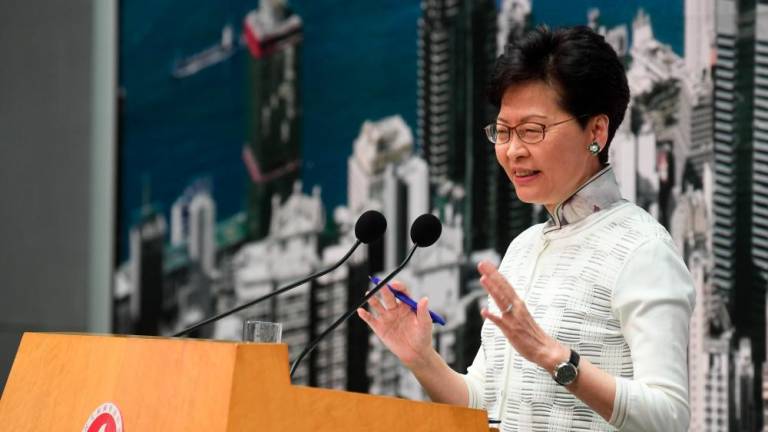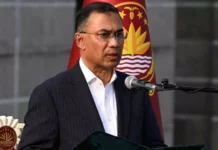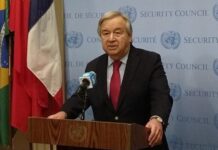HONG KONG: About two million protesters choked Hong Kong’s streets in a powerful rebuke of a reviled extradition law, organisers said Sunday, piling pressure on the city’s embattled pro-Beijing leader who apologised for causing “conflict” but refused to step down.
The show of force saw vast crowds marching for hours in tropical heat, calling for the resignation of chief executive Carrie Lam, who was forced to suspend the bill as public anger mounted.
Throngs of largely black-clad protesters snaked their way for miles through the streets to the city’s parliament — with the organisers’ estimate for the crowd size doubling an already record-breaking demonstration the previous Sunday in the city of 7.3 million.
The estimate has not been independently verified but if confirmed it would be the largest demonstration in Hong Kong’s history.
Hong Kong’s biggest protest to date was a massive rally in support of Tiananmen protesters in May 1989, before Beijing’s deadly crackdown, which sources at the time put at roughly 1.5 million strong.
Police, who historically give far lower estimates for political protests, said 338,000 people turned out at the demonstration’s “peak” Sunday.
Thousands were camping out overnight to continue the protest, including outside the legislature, with the police seemingly ceding the streets to the jubilant masses.
Critics fear the Beijing-backed law will entangle people in China’s notoriously opaque and politicised courts and damage the city’s reputation as a safe business hub.
Lam’s office put out a statement late Sunday admitting that shortcomings in how her administration handled the law had “led to a lot of conflict and disputes” and “disappointed and distressed many citizens”.
It came a day after she announced she would postpone the law indefinitely.
But it fell well short of protester demands that she resign, shelve the bill permanently and apologise for police using tear gas and rubber bullets earlier in the week.
The Civil Human Rights Front, which is organising the rallies, said Hong Kongers would protest and strike on Monday “until their voices are heard”.
The international finance hub was rocked Wednesday by the worst political violence in decades as protesters were dispersed by baton-wielding riot police.
Many accused the police of using excessive force, and anger was further fanned by authorities calling the largely young protesters “rioters”.
Nearly 80 people were injured in the unrest — including 22 police officers — with both sides showing a willingness to escalate action and reaction to levels unseen in the usually stable business hub.
Police said they had no choice but to use force to meet violent protesters who besieged their lines outside the city’s parliament.
But critics — including legal and rights groups — say officers used the violent actions of a tiny group of protesters as an excuse to unleash a sweeping crackdown on the predominantly young, peaceful crowd.
One man died Saturday when he fell from a building where he had been holding an hours-long anti-extradition protest.
He had unfurled a banner on scaffolding attached to an upscale mall, but fell when rescuers tried to haul him in. Police said they suspected the 35-year-old was suicidal.
Throughout the day, demonstrators queued for hours to leave flowers and tributes where he fell.
The extradition furore is just the latest chapter in what many see as a battle for the soul of Hong Kong.
For the last decade the city has been convulsed by political turbulence between pro-Beijing authorities and opponents who fear an increasingly assertive China is stamping on the city’s unique freedoms and culture enjoyed since the handover from Britain in 1997.
Opposition to the extradition bill has united an unusually wide cross-section of Hong Kong, from influential legal and business bodies to religious leaders.
Lam’s decision to ignore those warnings and press ahead with the bill even after last weekend’s massive rally placed her administration under pressure from both opponents and allies. AFP







